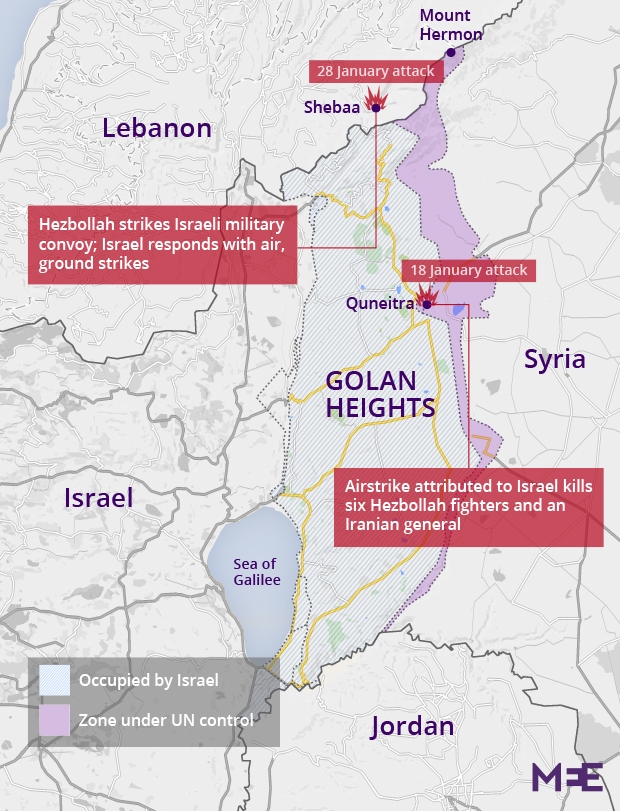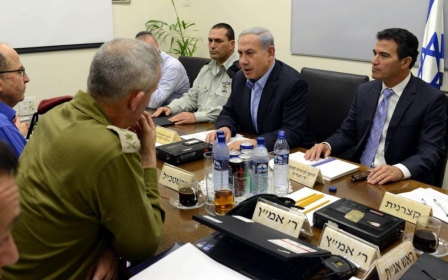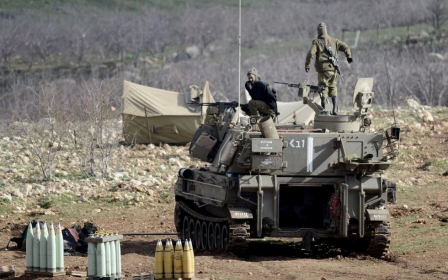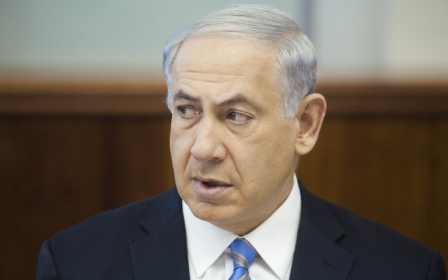Hezbollah sends Israel 'message for calm,' say sources
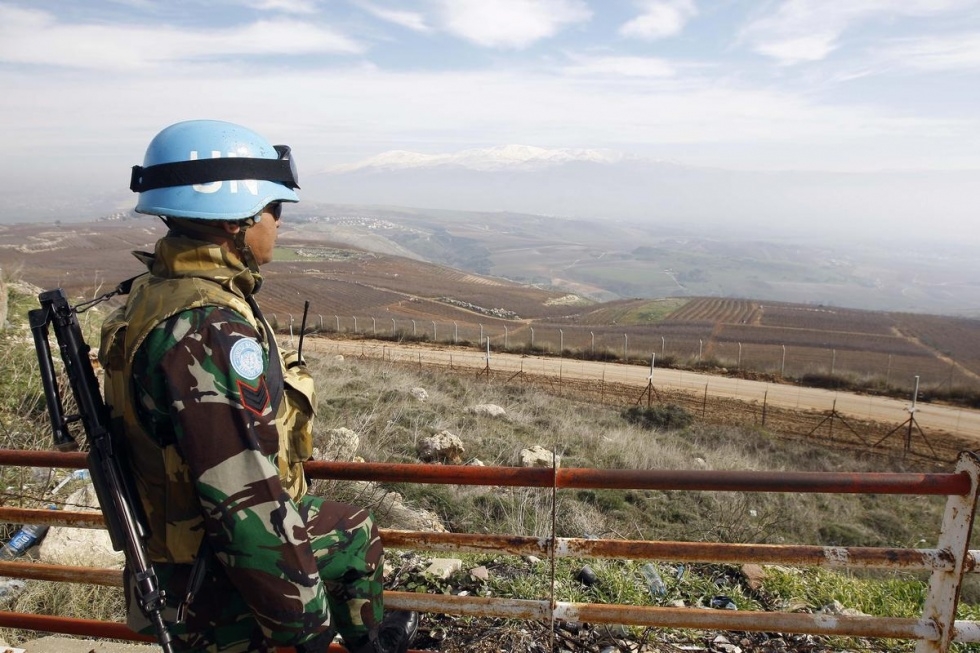
The Lebanese Hezbollah group has sent a message for calm to Israel, following the killing of two Israeli soldiers in an attack in Israel-occupied Shebaa Farms, Israeli sources have said.
Hezbollah sent the message to Israel through the United Nations Interim Force in Lebanon (UNIFIL) that the Lebanese group was not seeking to escalate the situation, the sources were quoted as saying by Yediot Aharonot newspaper.
Israeli Defence Minister Moshe Yaalon also said that Hezbollah did not want a further escalation.
"We have received a message via UNIFIL that from their point of view the incident is over," he told public radio.
The Israeli-Lebanese border was calm on Thursday.
"The night was very quiet and the impression we have here is that all sides want things to calm down," said MEE correspondent and photographer Oren Ziv, who was near the scene of the attack.
"The Raja village is closed to non-residents by the Israeli army, as the main road leading to the village was the place of the attack," said Ziv, adding that "two military funerals will be held today, one in Jerusalem and one in the south of Israel."
"On the occupied Golan Heights, there are more troops visible there than usual, but there is no mobilisation of forces in the north or any apparent preparations for an attack. They appear just on high alert," he said.
Earlier on Wednesday, Hezbollah claimed responsibility for killing two Israeli soldiers and wounding seven others in Shebaa Farms during an attack on an Israeli military convoy.
The Lebanese group said the Shebaa Farms attack had been in retaliation for the death of six of its fighters – along with an Iranian Revolutionary Guard general – in a recent drone strike in Syria.
The slain fighters had included two Hezbollah commanders and the son of Imad Mughniyah, a Hezbollah leader killed by a car bomb in Syria in 2008.
So far, Hezbollah has not issued an official note about the reported "message for calm". Israel has not officially talked about it either.
In 2006, Israel and Hezbollah fought a 34-day war in which more than 1,200 Lebanese – mostly civilians – were killed. In the same conflict, 160 Israelis – mostly soldiers – lost their lives.
Israel not to respond to Hezbollah attack: UNIFIL
A senior United Nations peacekeeping officer said Wednesday that Israel had informed UNIFIL that it would not respond to the attack by Hezbollah.
"The Israeli side told the United Nations Interim Force in Lebanon that it would not respond to the attack," the officer, requesting anonymity, told the Anadolu Agency.
A UNIFIL soldier – a 36-year-old corporal from Spain – was also killed in the violence. UNIFIL has not accused either Hezbollah or Israel of killing the soldier, but Spanish Ambassador to the UN Roman Oyarzun told reporters: "It is clear that this was because of the escalation of the violence and it came from the Israeli side."
The UN mission has been deployed since 1978 to ensure the cessation of hostilities between Lebanon and Israel in the area.
Israel said the attack had taken place on its "border with Lebanon." The Lebanese Foreign Ministry, meanwhile, said the attack had occurred on Lebanese soil.
Israeli Prime Minister Benjamin Netanyahu warned Lebanon's Hezbollah it will pay the "full price".
'Very harsh and disproportionate manner'
"Those behind today's attack will pay the full price," Netanyahu's office quoted him as saying at a meeting with Israeli's top security brass on Wednesday evening.
Hardline Foreign Minister Avigdor Lieberman said Israel should respond to the attack "in a very harsh and disproportionate manner, as China or the US would respond to similar incidents."
Army spokesman Brigadier General Moti Almoz warned that Israel was considering further action.
"This is not necessarily the last response," he wrote on Twitter.
During a Wednesday evening meeting with senior military and intelligence officials, Netanyahu sent a warning to the government of Lebanon and to Syrian President Bashar al-Assad.
"The government of Lebanon and the Assad regime share responsibility for the consequences of attacks originating in their territory against the state of Israel," he said.
Israeli army spokesman Lieutenant Colonel Peter Lerner said Wednesday's attack was the "most severe" Israel had faced since 2006.
UN to meet, US backs Israel
The UN Security Council called an emergency meeting to discuss ways to defuse tensions between the two sides, who fought a month-long war in 2006.
The United States stood by Israel after the exchange of fire.
"We support Israel's legitimate right to self-defence and continue to urge all parties to respect the blue line between Israel and Lebanon," State Department spokeswoman Jen Psaki told reporters.
EU foreign affairs chief Federica Mogherini appealed for an "immediate cessation of hostilities".
Questions have been raised in Israel about why the soldiers were travelling in unarmoured vehicles in the volatile area.
Not eager for a full-scale conflict
Analysts said that Israel, fresh from its summer war with Hamas in Gaza and heading for a general election in March, was not eager for a full-scale conflict with Hezbollah.
"Hezbollah has 100,000 rockets, compared with the 10,000 of Hamas," said analyst Boaz Ganor of the Herzliya Interdisciplinary Centre.
"The human cost of such a war would be enormous and no Israeli leader will be pro-active in this direction," he said.
Hezbollah is meanwhile deeply involved in Syria's civil war, fighting with President Bashar al-Assad's forces against Sunni rebels.
"The chances (of an escalation) are very slim, almost none, because none of the sides has an interest in moving to a big operation or a small war," Yaakov Amidror, a former major general and security advisor of Israel, told AFP.
"Hezbollah is very busy in Syria, the last thing that it needs is a second front," he said.
Tension in the area had been building before Wednesday's attack, especially after an Israeli air strike on the Syrian sector of the Golan Heights killed six Hezbollah fighters and an Iranian general on 18 January.
Hezbollah leader Hassan Nasrallah had earlier threatened to retaliate against Israel for its repeated strikes on targets in Syria and boasted the Shiite militant movement was stronger than ever.
Israel occupied parts of Lebanon for 22 years until 2000 and the two countries are still technically at war.
New MEE newsletter: Jerusalem Dispatch
Sign up to get the latest insights and analysis on Israel-Palestine, alongside Turkey Unpacked and other MEE newsletters
Middle East Eye delivers independent and unrivalled coverage and analysis of the Middle East, North Africa and beyond. To learn more about republishing this content and the associated fees, please fill out this form. More about MEE can be found here.


